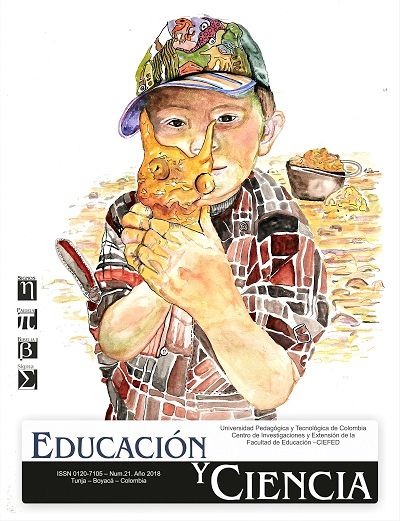A pedagogical device from rurality for the development of basic competences

Abstract
This article presents the results of a strategy aimed at the development of basic skills, using trending aspects that involve school knowledge typical of the rural context. Relationships of knowledge and powers of both teachers and students were established, which allowed better communication and mutual meaningful learning, giving valuable elements that contributed to the achievement of the objective. The article exposes the creation and implementation of a pedagogical deviced directed to the eighth grade students of the “Marco Antonio Quijano Rico” Educational Institution of the rural sector of the Municipality of Sogamoso;
Through the “research - action” methodology, apparently independent processes were unified which allowed the reflection and overcoming of problems inherent to the classroom in particular and significant contexts for students, a strategy that can be applied in similar contexts.
Keywords
pedagogical device, competence, education, rurality, context.
References
Cázares, R. A., & Gallardo, S. C. (2010). El enfoque de competencias y el currículum del bachillerato en México. Revista Latinoamericana de Ciencias Sociales, Niñez y Juventud, 8(1), 481-508.
DANE. (2000). Conceptos básicos. Colombia, Bogotá
Díaz, F., & Hernández Rojas, G. (1999). Estrategias docentes para un aprendizaje significativo. México, D.F.: McGraw-Hill.
Díaz Barriga, Á. (2011). Competencias en educación. corrientes de pensamiento e implicaciones para el currículo y el trabajo en el aula. Revista Iberoamericana de Educación Superior RIES, 2(5), 3-24.
Echeverry, R. P. (2011). Hacia una nueva definición de “rural” con fines estadísticos en América Latina. Reflexiones sobre lo rural: economía rural, economía de territorios. Santiago, Chile: Naciones Unidas.
Foucault, M. (1977). Saber y Verdad. Omicar(10).
García, S. (2010). Investigación Acción. Métodos de Investigación en Educación Especial. Recuperado el 17 de mayo de 2016, de https://www.uam.es/personal_pdi/stmaria/jmurillo/InvestigacionEE/Presentaciones/Curso_10/Inv_accion_trabajo.pdf
González, N., Zerpa, M. L., Gutierrez, D., & Pirela, C. (2007). La Investigación Educativa en el Hacer Docente. Revista de Educación Laurus, 13(23), 279-309.
Maxwell, J. (1996). Cualitative Research Desing. An interactiva Approach. California: Sage.
Meirieu, F. (1997). La escuela modo de empleo: de los métodos activos a la pedagogía diferenciada. Barcelona: Octaedro.
Restrepo, B. (2000). Aprendizaje basado en problemas (ABP) Formación de profesionales de la salud. Rionegro: programa UNI,13.
Rickards, J. P. (1980). Notetaking, underlining, inserted questions, and organizers in text: Research conclusions and educational implications. Educational Technology, 20(6), 5-11.
Salas, W. (2005). Formación por competencias en educación superior. Una aproximación
conceptual a propósito del caso Colombiano. Revista Iberoamericana de Educación, 7.
Tobón, S. (2005). Formación basada en competencias: pensamiento complejo, diseño curricular y didáctica. Bogotá, Colombia: Ecoe Ediciones.
Tobón, S. (2013). Formación integral y competencias: pensamiento complejo, currículo, didáctica y evaluación. Bogotá, Colombia: Ecoe Ediciones.